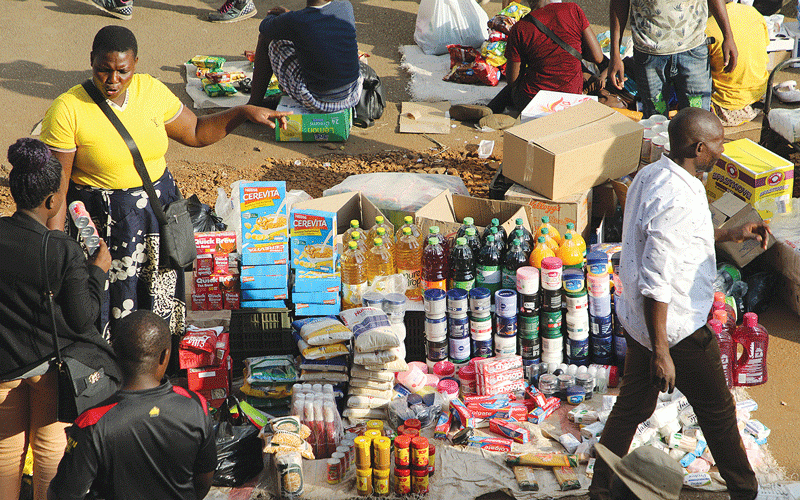
Vendors in the country’s major cities and towns have literally invaded all strategic points, including verandas of big retail shops, selling a variety of goods including basic commodities in foreign currency.
The chaos comes amid speculative reports that the biggest suppliers for the vendors are retailers that are chasing the United States dollar, which is readily available on the parallel market.
There are reports that some big retail shops are refusing to transact in the local currency citing various excuses, including malfunctioning point-of-sale machines.
President Emmerson Mnangagwa’s spokesperson George Charamba yesterday described the currency situation as “false chaos” and accused manufacturers and big retailers of sabotaging government.
“FALSE CHAOS: Behind this seeming chaos is the methodical BIG HAND OF BIG BUSINESSES!” Charamba said on his Twitter handle where he goes by the monicker Tinoedza Zvimwe.
“They use forex cheaply got from the auction to retool, order raw materials, manufacture, and then redirect their output into the informal sector through their AGENTS. The net result is complete dollarisation they falsely claim hurts them; and evasion of taxes for the very government that nourishes them. #ThisMadnessMustBeStoppedNow!” Charamba tweeted.
Consumer Council of Zimbabwe (CCZ) executive director Rosemary Mpofu confirmed reports of the failing electronic payment system.
“CCZ of late has been receiving consumer complaints from the transacting public, among them retailers charging some products exclusively in US$ only, and rejection of the Zimbabwean dollar, notably mobile transactions either by phone or swipe cards,” Mpofu said.
- Mthuli Ncube abandons struggling consumers
- Mthuli Ncube abandons struggling consumers
- Zimbabwe’ banks are bleeding
- Brace for hard times, ex-CCZ boss warns
Keep Reading
“At times, consumers are advised that either the mobile network is poor or lack of connectivity, and non-functioning swipe machines in a bid to harness as much forex from consumers. We appeal to retailers practising such unethical practices to desist as such a move impacts on consumer spending, and limits rights to choice as we are using a dual currency system. The Zimbabwe dollar remains legal tender, that should not be rejected until such a time monetary authorities advise so.”
Confederation of Zimbabwe Retailers president Denford Mutashu said the price hikes were influenced by some unscrupulous businesspeople in an attempt to sabotage government ahead of the general elections.
“The unjustified price hikes are uncalled for,” Mutashu said.
“Some retailers are deliberately withdrawing point-of-sale machines to reject payments in local currency. Our position is that retailers should continue accepting the local currency as legal tender. The situation right now is very normal as we are approaching elections. We have a situation where business has suddenly rejected the local currency. It’s difficult to understand the sudden overcharging of goods and services where the parallel market rate has shot up to US$1: $4 000 against the official exchange rate of US$1:$1 500.”
Over the weekend, major shops and bars in Harare’s residential areas were refusing consumers access to the point-of-sale machines.
Some big retail shops were using radio paging systems to announce electronic system payment failures for customers transacting in the local currency.
In recent years, Zimbabwe has adopted a dual currency system, allowing for transactions in both the Zimbabwean dollar and the US dollar. The growing appetite for the United States dollar in Zimbabwe has raised concerns among industry leaders.
Mutashu warned that if left unchecked, this insatiable demand could lead to full-time dollarisation of the economy.
To prevent such an outcome, it is imperative for all stakeholders to comply with currency laws, promote financial inclusivity, and protect consumer rights, he said.
A survey by NewsDay yesterday revealed that vendors are now taking advantage of the situation, buying goods in local currency and reselling them on the streets in United States dollars.
Other big retail shops reserved a single check out point for local currency payments, which resulted in long winding queues, which forced some consumers to give up buying groceries from the shops.
Government has been downplaying the currency chaos saying it has engaged industry to tame the sky-rocketing prices of basic commodities.
Writing in his weekly column in a State-owned newspaper on Sunday, Mnangagwa said government had come up with several measures to stabilise the economy in “good faith”, but was being betrayed by the business sector.
“We even wonder if at all we are dealing with business anymore or with the politicians disguised as company executives seeking a political upset. Equally, politicians seeking to engineer market failures for definite political outcomes will be dealt with as political opponents and through rules of appropriate politics,” Mnangagwa said.
The Zimbabwe dollar has been fast losing value, while some supermarkets are now pricing their goods exclusively in United States dollars to avoid losses.
Prices in local currency have been changing everyday, with a loaf of bread which cost $1 800 last week, now selling for $4 000.
Yesterday, the Zimbabwe dollar was trading at $2 059,68 to the US$ on the official market, while the parallel market rate was US$1: $4 000.
Consumers were in “panic buying” for fear of a repeat of the 2008 situation, where some goods just disappeared from supermarket shelves.










